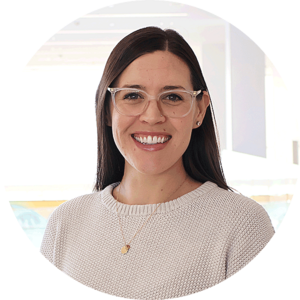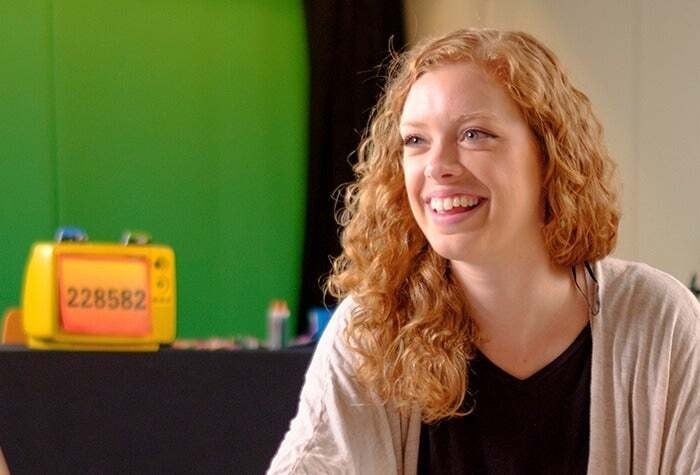Therapeutic Recreation degree

Remove barriers and facilitate meaningful experiences to help others
Activity, sport, creative arts, music, or nature-based activities – there are many ways to help people enhance their quality of life, foster social connections, support independent living, and have fun, too.
Recreation therapists are health care providers who work in clinical and long-term care environments who address emotional, physical, and social needs – and use leisure, recreation, and play to help people of all abilities meet their goals, wherever they are.
In one of just three such programs in Ontario, you’ll gain valuable academic and practical experience to prepare you for a career in therapeutic recreation. You'll learn how to develop formal, evidence-based programming and get hands-on experience working with populations of interest through a required 105-hour practicum placement and a required 560-hour internship.
Throughout your degree, you can pursue the requirements for the academic pathway to becoming a Certified Therapeutic Recreation Specialist (CTRS) through the National Council for Therapeutic Recreation Certification, allowing you to practise across North America. Upon graduation, you’ll also be eligible for registration with Therapeutic Recreation Ontario.
Have your sights set on another professional health program? Therapeutic Recreation can also be your stepping stone to specialized programs such as occupational therapy.
What courses will you take in Therapeutic Recreation?
First-year courses
You'll take Recreation and Leisure Studies courses that dive into the theory and importance of leisure; recreation programming; and the foundations of inclusion, disability, and therapeutic recreation.
September to December
- REC 100 – Introduction to the Study of Recreation and Leisure
- REC 101 – Introduction to Leisure, Sport and Recreation Management
- REC 120 – Experience Design and Delivery
- Learn about the overnight REC 120 retreat
- PSYCH 101 – Introductory Psychology
- HEALTH 107 – Sociology of Activity, Health, and Well-being
January to April
- REC 151 – Foundations of Therapeutic Recreation Practice
- HEALTH 150 – Foundations of Human Anatomy and Physiology
- Three electives
This is a sample schedule. Courses or when a course is offered may change depending on availability.
After first year
About half of the classes you'll take will be Recreation and Leisure Studies courses, with topics ranging from developmental and emotional disabilities to therapeutic recreation facilitation techniques. You'll be taught by certified therapeutic recreation professionals and will gain true hands-on experience, through REC 450, a mandatory 560-hour internship course, and REC 253, a mandatory 105-hour practicum course.
With your remaining classes, you can choose electives from many of the 100 subject areas at Waterloo to explore areas of interest, take pre-requisite courses, or pursue a minor.
View all the courses required for your degree.
Customize your degree in Therapeutic Recreation
Add areas of expertise to your degree by pursuing areas of focus within the program or by choosing a double major, joint honours, or the Event Management minor.
You can add additional areas of interest by including one or more of the minors available to all Waterloo students. Popular choices include Addictions, Mental Health, and Policy; Event Management; Psychology; Gerontology; and Social Development Studies.
Faculty:
Faculty of Health
Degree:
Bachelor of Arts in Therapeutic Recreation
Available as a co-op program?
Yes
Available as a regular program?
Yes
Available as a minor?
No
Build an awesome résumé. Get plenty of hands-on experience through practical courses, volunteer placements, and a required full-time internship in fourth year. Plus, we're the only such program in Ontario to offer multiple co-op terms.
15 electives = lots of choice. With 15 electives from disciplines that can include social work, psychology, and health, you’ll have the flexibility to shape your degree according to your specific interests.
Co-op = relevant paid work experience
In the world's leading co-op program, you'll explore potential careers, learn to interview for jobs, graduate with up to two years of valuable experience — and make money!
- Learn about Esther's co-op experiences in Hong Kong and at two Ontario hospitals.
Sample co-op job titles
- Recreation therapist
- Child and youth worker
- Community recreation facilitator
- Therapeutic recreation and community assistant
- Research assistant
Co-op work-study sequence
Starting in second year, you'll normally alternate between school and work every four months, integrating your classroom learning with real-world experience. You can return to the same employer for a couple of work terms to gain greater knowledge and responsibility or work for different employers to get a broad range of experience.
| Year | September to December (Fall) | January to April (Winter) | May to August (Spring) |
|---|---|---|---|
| First | Study | Study | Off |
| Second | Study | Co-op | Study |
| Third | Co-op | Study | Co-op |
| Fourth | Study | Co-op | Study |
| Fifth | Co-op | Study | - |
Your first work term will be halfway through second year (January to April 2028).
What can you do with a degree in Therapeutic Recreation?
As a graduate, you can work with clients in settings ranging from long-term care facilities to local community agencies. You’ll also be eligible to apply for registration with Therapeutic Recreation Ontario and for certification with the U.S. National Council for Therapeutic Recreation Certification.
Recent graduates
- Vocational instructor — Ontario Shores Centre for Mental Health Sciences
- Child life specialist — Hospital for Sick Children
- Therapy assistant — Mackenzie Innovation Institute
- Recreation therapist — West Park Healthcare Centre
- Counsellor — Alzheimer Society of Peel
- Outreach worker — St. Matthew’s House
- Communications officer — Carey Outreach Ministries
Graduate stories
Learn about what recent graduates are doing with their degree
Learn more about the future of careers in health and helping professions.
Read profiles and view videos about the path Recreation graduates took to pursue their career.
Further education
While the full range of further education depends on your individual interests, graduates commonly pursue a master's, PhD, or other professional health-care program in occupational therapy, social work, and public health.
Common questions about the program
Why do I apply for Recreation and Leisure Studies to study Therapeutic Recreation?
Recreation and Leisure Studies is the entry program - or gateway - to three distinct majors: Recreation, Leadership, and Health; Sport and Recreation Management; and Therapeutic Recreation. You'll apply to Recreation and Leisure Studies and pick Therapeutic Recreation as your major on your application. Once you confirm your Offer of Admission, we'll enroll you in Therapeutic Recreation.
Though each of the majors has a different focus, specialized courses, and unique identity, you'll be a part of the whole Recreation and Leisure Studies community and get to know students outside your major too!
What do recreation therapists actually do?
While this program can lead to a range of careers, many graduates choose to work as recreation therapists. Recreation therapists "use recreation, leisure, and play as treatment modalities to support purposeful and meaningful interventions that are based on individual strengths and values, and are guided by assessments." (Canadian Therapeutic Recreation Association)
What’s the difference between Therapeutic Recreation and similar programs at other universities?
Waterloo’s program includes an overview of the entire recreation and leisure sector and has developed a solid reputation amongst employers. We work with a large network of organizations for our 105-hour practicum and 560-hour internship requirements, and with additional experiential learning opportunities like co-op and our EDGE certificate program, you’ll have a distinct advantage when applying to careers or further studies.
As a Waterloo graduate, you can also be eligible for registration with Therapeutic Recreation Ontario (TRO) and certification with the National Council for Therapeutic Recreation Certification (NCTRC).
What’s the difference between a diploma and a degree in Therapeutic Recreation?
The essential difference between a diploma and degree is employer-specific certification requirements. Some employers, especially at large hospitals or healthcare networks, require certification while other employers don't. All graduates can qualify to work as a recreation therapist, but only graduates from a Bachelor's program can write the exam to become a Certified Therapeutic Recreation Specialist (CTRS), which is needed for jobs in some fields.
How long does it take to complete this program?
- It takes four years to complete this program as a full-time student through the regular system of study in which you’ll take courses between September and April each year and have your summers off.
- You can also choose the co-op system of study where you’ll alternate between full-time studies and full-time jobs relating to your program. A co-op program takes five years to complete — and you’ll graduate with nearly two years of paid work experience.
- It could also be completed over a longer period as a part-time program.
Is this program available online?
No. While you may be able to take some courses online, most courses required for the degree are available through in-person classes only.
Admission requirements
Ontario students: six Grade 12 U and/or M courses including
- Any Grade 12 U English (minimum final grade of 70% is required)
Admission average: Low 80s (co-op and regular)
Not studying in Ontario? Search our admission requirements for Recreation and Leisure Studies (RLS). You'll apply to RLS for the Therapeutic Recreation major.
How to apply
You'll apply to Recreation and Leisure Studies and choose Therapeutic Recreation as your major.
If you're admitted to the program, your Offer of Admission will be to Recreation and Leisure Studies. Once you accept your offer, you’ll be enrolled in Therapeutic Recreation and start that major in September.
Get information about programs, applying, and more!
Subscribe to our monthly newsletter
Get valuable updates and tips sent straight to your inbox!

Connect with us
Questions about courses, programs, requirements, or careers?
Please contact Clare Stevens, our Faculty of Health recruitment co-ordinator who can answer any questions you have.
From the Missing Manual
Visit our Missing Manual website for tips and advice from Waterloo students and staff. Topics include

Powerful work terms in Therapeutic Recreation
Through a powerful work term at an important Canadian community organization, a Therapeutic Recreation student greatly improved her communication skills.

How to become a recreation therapist
If you’re interested in a health care or human service profession — and you’d like to improve the functioning and quality of life for others through recreation, leisure, and play — recreation therapy could be for you.

Helping kids at SickKids
Rachael was searching for a career where she could make a positive impact on people’s lives. The Therapeutic Recreation program at Waterloo helped her find it.